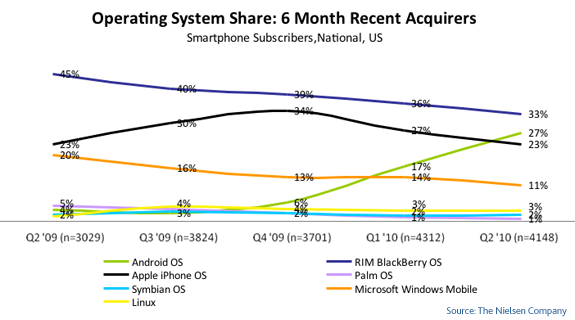Android Smartphones Overtake iPhone in the U.S.
iPhonemania may have gotten a jump start over the weekend with the device's launch in an additional 17 countries, but Apple was this week dealt big blows in its battle against Google's Android OS.
Smartphones currently account for 25 percent of the U.S. cell phone market and market penetration for these kinds of devices is improving at an incredible rate (it was just 16 percent this time last year). It's no secret that Apple is insanely popular among mainstream smartphone users, however Android devices are growing more in popularity with each passing day. In fact, Android devices are more popular with those new to smartphones. In the last six months, Android accounted for 27 percent of new smartphone subscribers, compared to Apple's 23 percent (Nielsen). Though Nielsen research shows that BlackBerry remains the most popular choice for new subscribers (33 percent), Android is the only OS that doesn't show a downward trend.

So Nielsen says Android is more popular with new subscribers, but its not the only research firm talking about Google's mobile OS and its growth in recent months. Canalys yesterday said that Android had seen sales growth of 886 percent compared to the same period last year. Apple is said to have seen growth of 61 percent, while RIM grew 41 percent. As far as the US smartphone market is concerned, Canalys reports that Android devices represent 34 percent share of the US market, while RIM accounts for 32 percent and Apple has 21.7 percent.
Check out the full press release from Canalys below.
Android smart phone shipments grow 886% year-on-year in Q2 2010 - Nokia retains smart phone leadership position, but competitors close the gap Palo Alto, Singapore and Reading (UK) – Monday, 2 August 2010 Nokia retained a substantial lead in the worldwide smart phone market in Q2 2010, achieving a 38% market share. The vendor shipped a record 23.8 million smart phones during the quarter, representing growth of 41% on a year ago, as it focused on delivering affordable smart phone offerings to the market, such as its popular 5230 touch-screen handset, based on the Symbian operating system (OS). But Nokia's market dominance is not as unassailable as it once was, with its performance outpaced by growth in the smart phone market as a whole. The smart phone market grew by 64% annually worldwide in Q2 2010. At the same time, shipments of RIM's BlackBerry smart phones grew by 41%. Helped by the continued strong performances of devices such as the Curve 8520, it was once again the second placed vendor with an 18% market share, while also retaining its leadership position in North and Latin America. Despite a period of turbulent PR, initial shipments of the iPhone 4 were predictably strong and contributed to Apple's 61% growth and worldwide market share of 13% for the quarter. But analysis of Canalys' detailed, globally consistent data shows it is the collective growth of Android device shipments across a range of handset vendors' portfolios that is most remarkable. With key products from HTC, Motorola, Samsung, Sony Ericsson and LG, among others, shipments of smart phones running the Google-backed Android operating system grew an impressive 886% in Q2 2010. 'The latest release of our detailed and complete country-level smart phone shipment data for Q2 2010 clearly reveals the impressive momentum Android is gaining in markets around the world,' said Canalys VP and Principal Analyst, Chris Jones, commenting on the publication. 'In the United States, for example, we have seen the largest carrier, Verizon Wireless, heavily promoting high-profile Android devices, such as the Droid by Motorola and the Droid Incredible by HTC. These products have been well received by the market, with consumers eager to download and engage with mobile applications and services, such as Internet browsing, social networking, games and navigation.' The United States smart phone market grew 41% year on year. It is the largest smart phone market in the world by a significant margin, with 14.7 million units accounting for 23% of global shipments in Q2 2010. Android devices collectively represented a 34% share of the US market in the quarter, and with growth of 851% Android became the largest smart phone platform in the country. US and China smart phone market 'The story in the Asia Pacific region is similarly optimistic around Android,' noted Senior Analyst, TY Lau. 'Android devices are gaining good traction in markets such as mainland China and South Korea, with growing numbers of consumers wanting more sophisticated smart phones.' China was the world's second largest smart phone market in Q2 2010 for the sixth consecutive quarter, with shipments of 6.9 million units representing 11% of the worldwide total. Android devices combined reached almost 475,000 units in Q2 2010 from no presence in the country a year ago. It is also important to note that China Mobile is committed to developing its own platform, OMS, based on Android, and an additional 174,000 smart phones shipped in the quarter running OMS. 'Given Google's substantial involvement in the Open Handset Alliance (OHA), that its relationship with the Chinese authorities appears to have improved recently, and that its operating licence has been renewed, will help reduce concerns that tensions could have an impact on the potential for the OHA-based Android and OMS platforms in the country, particularly among vendors that have committed resources to producing Android devices for the Chinese market,' added Lau. 'Nokia's Symbian devices continue to dominate the market, but other vendors are clearly making good headway with Android in China. Motorola and Samsung, as well as local vendors, such as Dopod, Lenovo and Huawei, are achieving promising volumes on the platform, and Android devices held a 7% share in China this quarter.' Despite a close relationship with its strategic partner Dopod, HTC, the world's leading Android device vendor, announced last week that it is entering the Chinese market with its own-branded smart phones. With a population of 1.3 billion, China represents a market with enormous growth potential and Canalys expects Android to be among the platforms that will drive growth in the coming quarters and years. Growth in the worldwide smart phone market reflects the increasing importance of smart phones in device vendors' and operators' handset portfolios, as growing numbers of consumers appear eager to engage with mobile applications and connected services. 'Expect to see smart phones accounting for a growing proportion of the wider mobile phone market as they become increasingly affordable to more customers,' said Canalys Senior Analyst, Pete Cunningham. 'By 2013, smart phones will grow to represent over 27% of shipments worldwide, with the proportion in some developed markets in Western Europe surpassing 60% and 48% in North America.' Canalys' annual smart phone market trends report, now in its ninth successful year, pulls together, in a concise format, qualitative analysis of key market trends, top-level market share and shipment estimates for the leading vendors, comparative analysis of vendors' performance and evaluation of their strengths and weaknesses, and forecasts for future market development. The new Canalys smart phone market trends report is now available. More details can be found at www.canalys.com/services/reports. Canalys analysts in Asia Pacific, the Americas and EMEA are available for press interviews on topics related to mobile devices and the growing ecosystem for mobile applications and services. To arrange an interview, please send a request to press@canalys.com. Analyst biographies, with photos, are available here.
(Source: Engadget)
Sign up to get the BEST of Tom's Guide direct to your inbox.
Get instant access to breaking news, the hottest reviews, great deals and helpful tips.
Jane McEntegart works in marketing communications at Intel and was previously Manager of Content Marketing at ASUS North America. Before that, she worked for more than seven years at Tom's Guide and Tom's Hardware, holding such roles as Contributing Editor and Senior News Editor and writing about everything from smartphones to tablets and games consoles.
-
milktea This just shows that open-source is perferred. And it's the way of the future in application.Reply -
"Smartphones currently account for 25 percent of the U.S. smartphone market"Reply
What makes up the remaining 75% of the smartphone market, if not smartphones? Cleverphones? -
ngom52 Hell yeah, it's about time! Now if only google can improve on the android market international payments option..........Reply -
jojesa Smartphone25"Smartphones currently account for 25 percent of the U.S. smartphone market"What makes up the remaining 75% of the smartphone market, if not smartphones? Cleverphones?I think it should be : Smartphones currently account for 25 percent of the U.S. cellphone marketReply -
desidude006 no duh... android phones will overtake iphone sales. The android OS is on over a dozen phone. While the iphone OS is obviously exclusive to the iphone.Reply -
wardy22 Breaking news: the combined clientele of Verizon, Sprint and T-mobile is actually more than AT&T?Reply -
tehmoonrulz desidude006no duh... android phones will overtake iphone sales. The android OS is on over a dozen phone. While the iphone OS is obviously exclusive to the iphone.wardy22Breaking news: the combined clientele of Verizon, Sprint and T-mobile is actually more than AT&T?ThisReply
-
bonezy desidude006no duh... android phones will overtake iphone sales. The android OS is on over a dozen phone. While the iphone OS is obviously exclusive to the iphone.Reply
wardy22Breaking news: the combined clientele of Verizon, Sprint and T-mobile is actually more than AT&T?
tehmoonrulzThis
Pretty sure you're all missing the actual interesting information here. Like you said, the user base of these companies hasn't fluctuated over this graph much, right? So, why then, aren't the OS lines straight across, if they are going exactly by clientele numbers? Exactly. Like the article states, it's the trends we're interested in. As in, pay attention in particular to the black and green lines, and how they relate. It's about emerging technologies and adoption / adoption rates.
Critical analysis ftw. -
SASKEL I remember someone told me it'll never happen, Apple would rule the school..well, I was right then and now, and soon Android will have more appsReply -
wardy22 SASKELI remember someone told me it'll never happen, Apple would rule the school..well, I was right then and now, and soon Android will have more appsReply
in my opinion i would have to wait and see the at&t android numbers. if, hypothetically, the iphone were offered to all companies I'm sure the results would be much different.
